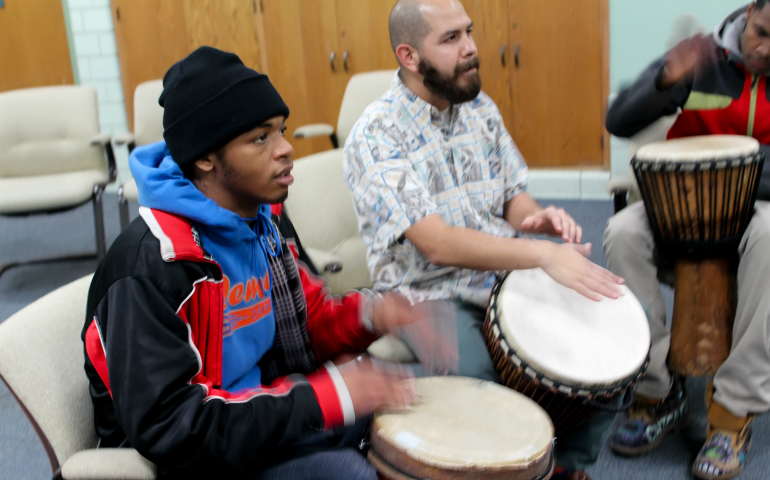
Willie Davis, left, participating in one of the drumming circles at Precious Blood Center. (Juan Acuna)
Editor's note: "Reconciliation in Chicago" is NCRonline's newest blog series, a weekly blog from the Precious Blood Ministry of Reconciliation, a ministry of the Missionaries of the Precious Blood based in Chicago's Back of the Yards neighborhood. Each post will feature hopeful reflections from the ministry's staff and volunteers, as they share their stories about working with youth and families affected by violence and incarceration.
"Reconciliation in Chicago" will be published every Monday at the feature series page Reconciliation in Chicago.
He wanted to apologize, but his lawyer said, "Absolutely not!" He wanted to admit that he did it and wanted to say how sorry he was, but his lawyer refused to allow him to say anything, let alone admit to any wrongdoing. He explained to Malik, a 15-year-old youth from the South Side of Chicago that he was to deny any knowledge of the incident. Malik was detained in the Cook County Juvenile Detention Center in Chicago and was being charged as an adult for robbery.
Malik sat with 10 other youth in a drumming circle (a restorative justice practice using djembe drums) inside the detention center. Even though he was being charged as an adult, his age meant that he would be housed in juvenile detention until his 17th birthday. On his birthday he would be transferred to an adult facility. In the drumming circle Malik said that he wanted to tell the victim -- a middle-aged man -- that he was sorry. The others in that circle nodded their heads as if to say that they understood. They, too, had thought a lot about the wrongs they had committed and how they wanted to change.
A couple of months earlier, Malik had robbed the man of his phone. He didn't have a weapon but was still charged as an adult with aggravated robbery, a felony. As he sat in the circle, looking even younger than his 15 years, he spoke softly about how he wanted to change. He spoke of the pain he had caused his mother and younger brothers and sisters.
Malik really didn't understand the severity of his case and the amount of time that he could spend in prison. He kept saying over and over that he was not a bad person. Some of the other youth who sat in that circle and who were also charged as adults, assured him that he was not alone and that they understood his anxiety. They, too, had been told over and over how they were "bad."
When the time came for sentencing, over a year later (Malik had pled guilty), the prosecuting attorney spoke harshly about how Malik was an uncaring "thug" and a "menace to society." He went on to stress how he lacked any remorse for the crime he had committed. "Never once," he said, did this young man admit that he did anything wrong!" The prosecutor repeated several times, "At no time did this defendant express any remorse for his crime." Of course nothing could have been further from the truth, but no one would ever hear the story of Malik or of the man whose phone was taken. Only how a law had been broken and the person who was deemed guilty would be punished.
As a society, we speak about accountability, and rightfully so. We want people to "own up" to the harm they have done. However, in a retributive system, what we create is an environment where the parties are told to deny any responsibility and only be concerned with their own needs. Both Malik's lawyer and the state's attorney were seeking only what was in the interest of their respective clients. The very system that pretends to have as its goal that people be held accountable thwarts the very thing it claims to support.
Malik was willing to be held accountable but was rejected at every juncture. True accountability is inseparably linked with a commitment toward others. It is the willingness to speak the truth with no expectation of something in return. But it has to be an environment that values the persons involved, encourages truth, seeks repair for the harm done, and works toward reconciliation and healing.
It is often said that restorative justice is how you would want it to be if it were your child. I believe most of us want our children to be held accountable, but in such a way that it doesn't demean them or label them a menace to society.
Too many people think that restorative justice seeks to diminish responsibility, when the truth is it values responsibility. Restorative justice focuses on the harm done and seeks ways to repair that harm. It holds those responsible for causing the harm accountable and strives to pave a way toward healing and reconciliation.
[Precious Blood Fr. David Kelly is executive director of Precious Blood Ministry of Reconciliation.]
A version of this blog previously appeared on the website of Precious Blood Ministry of Reconciliation. NCRonline presents the blog in collaboration with Precious Blood Ministry of Reconciliation.



